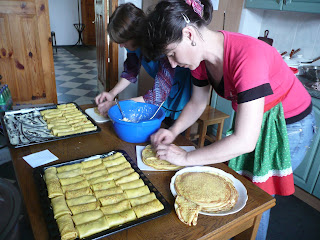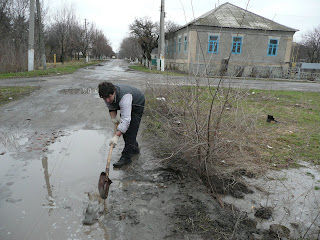
A beautiful summer day - our last in Ukraine. Over the past three months, working together with our Ukrainian director, we've initiated 19 major projects and provided aid to many more institutions and individuals. We are just one link in the chain making these projects possible. The following example illustrates this process.
It was a few days after Easter. Our cook at the Centre made us aware of needy families caring for invalid children at home. One case, which I highlighted in an earlier blog, touched our hearts in a particular way. When Drs. Art & Marlyce Friesen (board member) visited us several weeks ago we visited this family again. Marlyce writes the following "....we drove to the village and found our way to a small apartment. We were greeted by a smiling woman in her early fifties who ushered us into the family's small bedroom - four beds lining the walls, with just enough room to walk between. Lying in one of these beds was Igor Vladimirovich. The mother told us this story.
Twenty-one years ago she was pregnant with Igor. She developed difficulty with the delivery and a C-section was performed. Tragically her infant son suffered severe injuries which left him with profound cerebral palsy. He has no use of his arms and legs and is unable to sit. Although his mother feels he understands much of what is going on around him, he is non-verbal except for "Ma-Ma' and 'Pa-Pa'.
Igor lies in bed all day and hasn't been out of this room for three years. His mother is unable to leave him unattended because he has epileptic seizures several times a day. He cannot control his bladder and bowel function and needs frequent diaper and bedding changes. His mother does laundry by hand.
They live in poverty. Windows are kept closed even on warm days to prevent rats from entering. Her husband is also ill, suffering the effect of years of excessive alcohol consumption. The family receives a pension to help care for the son but it does not even cover essentials. Because Igor requires full-time care, his mother is not able to plant and tend a vegetable garden which most villagers have to provide essential food for the family.
As the mother tells this story she lovingly strokes her son's face and cups his chin in the palm of her hand and we realize she is seeing the beauty of God's creation in her disabled son and even though there were tears in our eyes and our hearts were aching we rejoiced in the miracle of a mother's unfailing love."
A few days later we received an email from a friend at home in Canada asking whether there might be a project our Care Group could take on before they disband for the summer. In less than a week they raised enough funds to buy this family a washing machine,  laundry soap, sheets, towels, diapers and a window screen.
laundry soap, sheets, towels, diapers and a window screen.
 laundry soap, sheets, towels, diapers and a window screen.
laundry soap, sheets, towels, diapers and a window screen. What a joy to deliver the machine this afternoon. We believe the best support for Igor is to support his loving, care-giving mother. She was speechless; overwhelmed. She told how her hands ached from wringing the wash each day and how this was particularly difficult in winter. Then she couldn't stop smiling.
We are grateful for each link in the chain that makes help possible, our North American board which sets policy and approves projects, our cook who became aware of the need, directors who investigate and facilitate, our truly caring Care Group at home and finally our maintenance man who helps when installations are necessary. What a joy to be a link in this chain and what a wonderful way to complete our assignment.








.jpg)


















.JPG)
 I can't take credit for this picture. So far I haven't had the courage to stop and take a photo for fear of being slighted, because sadly I don't have the language to ask for permission.
I can't take credit for this picture. So far I haven't had the courage to stop and take a photo for fear of being slighted, because sadly I don't have the language to ask for permission..JPG)









